
-
Find the right food for your petTake this quiz to see which food may be the best for your furry friend.Find the right food for your petTake this quiz to see which food may be the best for your furry friend.Featured products
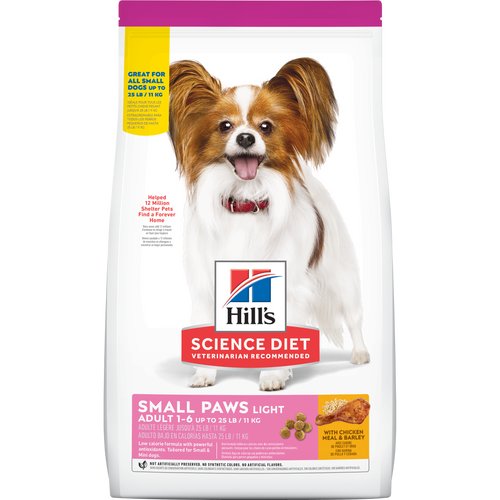 Adult Light Small Paws with Chicken Meal & Barley Dog Food
Adult Light Small Paws with Chicken Meal & Barley Dog FoodLow calories for less active small & mini dogs
Shop Now Hill's Science Diet Adult Oral Care Chicken, Brown Rice & Barley Recipe Dog Food
Hill's Science Diet Adult Oral Care Chicken, Brown Rice & Barley Recipe Dog FoodClinically proven kibble technology to reduce plaque & tartar build-up
Shop Now Adult Perfect Digestion Salmon, Whole Oats, and Brown Rice Recipe Dog Food
Adult Perfect Digestion Salmon, Whole Oats, and Brown Rice Recipe Dog FoodScience Diet's breakthrough nutrition supports ultimate digestive well-being & healthy microbiome
Shop NowFeatured products Adult 7+ Chicken Recipe cat food
Adult 7+ Chicken Recipe cat foodSupports energy level and beautiful fur in mature cats
Shop Now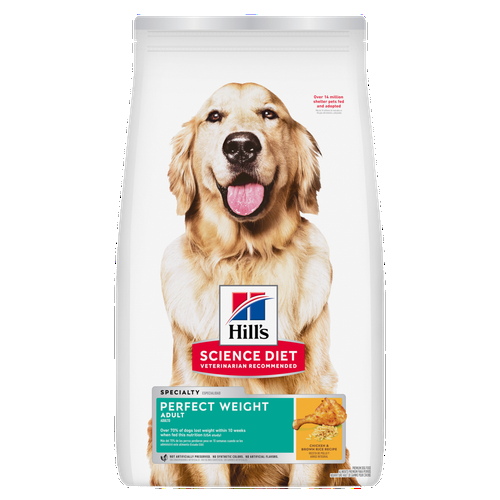 Adult Perfect Weight Chicken Recipe Dog Food
Adult Perfect Weight Chicken Recipe Dog FoodOver 70% of dogs lost weight within 10 weeks when fed this nutrition (USA Study)
Shop Now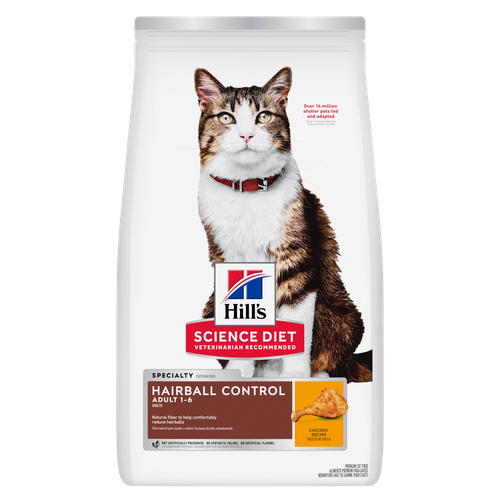 Adult Hairball Control Chicken Recipe Cat Food
Adult Hairball Control Chicken Recipe Cat FoodNatural fiber to help comfortably reduce hairballs
Shop Now -
Dog
- Dog Tips & Articles
-
Health Category
- Weight
- Food & Environmental Sensitivities
- Urinary
- Digestive
- Joint
- Kidney
-
Life Stage
- Puppy Nutrition
- Adult Nutrition
- Senior Nutrition
Cat- Cat Tips & Articles
-
Health Category
- Weight
- Skin & Food Sensitivities
- Urinary
- Digestive
- Kidney
-
Life Stage
- Kitten Nutrition
- Adult Nutrition
Featured articles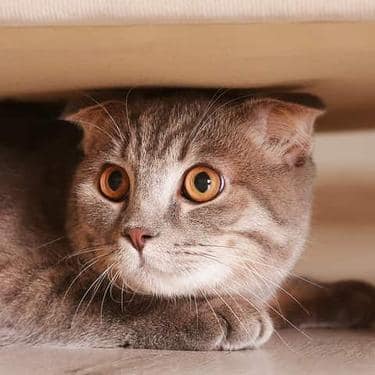 Keeping Pets Calm During Thunderstorms
Keeping Pets Calm During ThunderstormsIs your dog scared of thunder? Does your kitty dart under the bed at the first rumble? Learn a few tips for keeping your pets calm during the storm.
Read More How to Reduce Your Pet's Carbon Paw Print
How to Reduce Your Pet's Carbon Paw PrintHeaded outside? How you and your pets engage with nature can affect the environment, so here are some quick tips for reducing your pet's carbon paw print.
Read More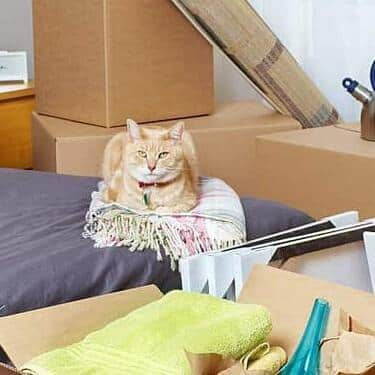 Moving With a Pet: A How-To Guide
Moving With a Pet: A How-To GuideDiscover helpful tips for moving with your pet including safety recommendations to keep in mind on moving day & pet behavior to watch for at your new home.
Read More -


Do cats fart? Although not necessarily the best topic for the dinner table, cat farts are an important topic for pet parents to learn about.
Like other gastrointestinal functions, flatulence is a natural occurrence in animals. Though not as often (or as loudly) as dogs and humans, the dignified cat does, indeed, pass gas.
Why Do Cats Fart?
Flatulence typically results from a buildup of gas in the digestive system, which is then released from the body. In most instances, cat flatulence occurs when your kitty swallows too much air, or it could be related to allergies or food.
Allergies to dust, pollen and pests such as ticks and fleas can also cause digestive distress, including vomiting, flatulence, or diarrhea. Flea allergies are quite common, says the Cat Hospital, but if these symptoms are profuse, you should check with your veterinarian before administering any treatment.
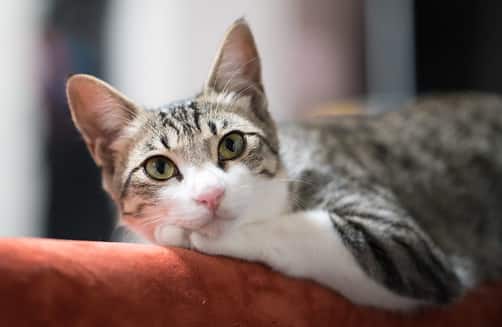
Food allergies or sensitivities can contribute to excessive gas, too. In fact, food is considered one of the main causes of cat farts. In its nutritional guidelines, the World Small Animal Veterinary Association (WSAVA) includes flatulence as an "altered gastrointestinal function" in its global "Nutritional Screening Risk Factor" checklist for veterinarian nutritional assessment. WSAVA's nutritional assessment accounts "for snacks, treats, table food, foods used for medication administration, and dietary supplements" — basically, anything your kitty puts in their tummy.


Tasty Tips
Food and Cat Farts
Choosing the right cat food for your feline friend is a great first step for managing their flatulence. Select a meal plan that includes the necessary vitamins and minerals and fits their size, age and activity level. Fiber, for example, is great for a cat's digestive system, but too much fiber can cause excessive gas. In certain cases, your veterinarian may recommend a therapeutic cat food like Hill's® Prescription Diet® that is specially formulated for proper feline digestion.
Also, cat farts are just one reason that you generally shouldn't give your cat people food. There are some foods, including some fruits, that are safe for cats in moderation, according to the Association of American Feed Control Officials (AAFCO). But consider how an excess of fiber can affect you. Now, think about that happening to your cat. Not good, right?
Though your cat can tolerate some people food, it's best to stick to food that's formulated for your furry friend, as emphasized by AAFCO: "Sharing food from the family table with pets can introduce a nutrition imbalance because pet foods typically offer an entire complete and balanced diet in a single product. In fact, many food items that humans eat are toxic to cats and dogs."
Always contact your vet before feeding people food to your kitty to ensure that it's safe for you to do so.
Flatulence and Health Issues
In rare cases, cat flatulence may be caused by a serious illness such as Tritrichomonasfoetus, an intestinal parasite that can produce gassy, "malodorous" feces, says the North Carolina State College of Veterinary Medicine. If your cat shows other signs of gastrointestinal distress, including excessive diarrhea and vomiting, and their gas has a strong smell, take them to the vet right away so a doctor can check for an underlying health issue.
Rest assured, most cat farts are not a cause for concern. They won't pass gas frequently, and when they do, they'll probably be just as surprised as you are. Cats are elegant creatures; you won't always hear it or smell it, as most gas is odorless — dainty and delicate, just like your cat.
Most of the time, a toot is just a toot. However, if you have any concerns, be sure to talk to your vet. He or she can also make recommendations on a quality food for your cat to ensure that you are properly feeding their digestive health.


One of our staff authors prepared this article for you
Related products

Over 70% of dogs lost weight within 10 weeks when fed this nutrition (USA Study)

Supports energy level and beautiful fur in mature cats

Natural fiber to help comfortably reduce hairballs
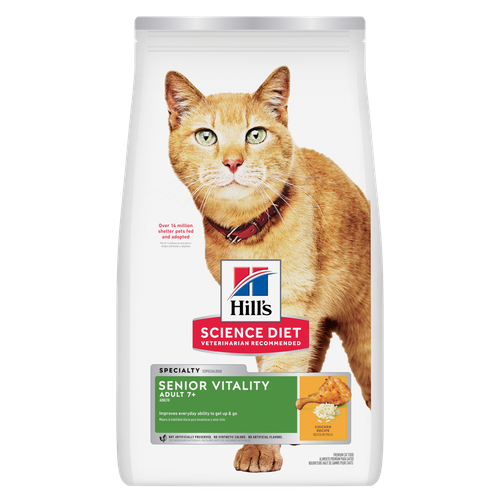
Improves Everyday Ability to Get Up & Go
Related articles
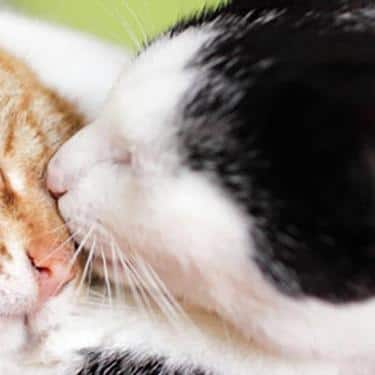
Learn the different factors that might be contributing to your cat's weight gain, and how bigger doesn't always mean better.

Discover how to identify cat sensitive skin and what you can do to help your cat thrive from head to paw.
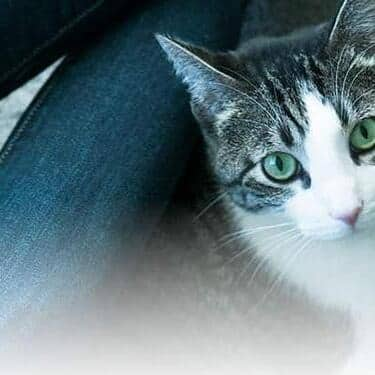
Brushing your cat's teeth is just as important as brushing your own. Learn signs or oral health problems in your cat and how to avoid them.

What is the best food for an overweight cat? Learn all about weight control food for cats, including what's in it and how it works.

Put your cat on a diet without them knowing
Our low calorie formula helps you control your cat's weight. It's packed with high-quality protein for building lean muscles, and made with purposeful ingredients for a flavorful, nutritious meal. Clinically proven antioxidants, Vitamin C+E, help promote a healthy immune system.
Put your cat on a diet without them knowing
Our low calorie formula helps you control your cat's weight. It's packed with high-quality protein for building lean muscles, and made with purposeful ingredients for a flavorful, nutritious meal. Clinically proven antioxidants, Vitamin C+E, help promote a healthy immune system.

